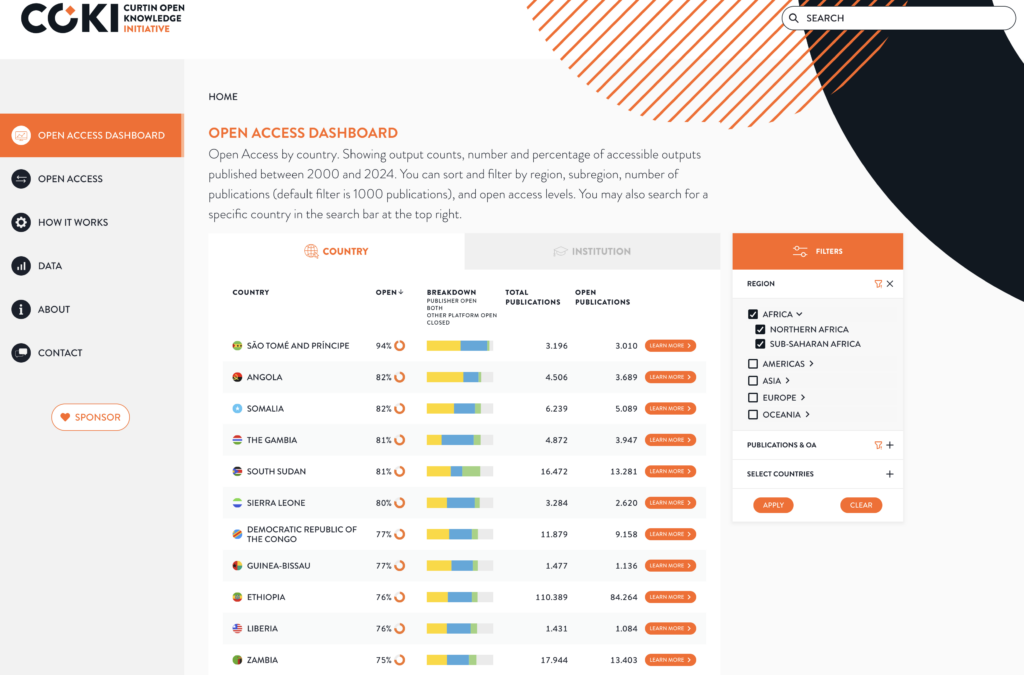Kathryn Napier and Lucy Montgomery joined us in this webinar session to talk about how The Curtin Open Knowledge Initiative (COKI) offers open access data, visualizations, and insights about global research systems, with a strong focus on equity and open knowledge.
Watch the recording
The slides are available at https://africarxiv.ubuntunet.net/handle/1/1532
Speakers’ profiles
Kathryn Napier
Dr Kathryn Napier is a data scientist who bridges the analytics gap in transdisciplinary research. She is currently the Technical Lead of the Curtin Open Knowledge Initiative (COKI), leading a team of data scientists and software developers who work with leading experts in open access and scholarly communication. Together, the COKI team develops tools and infrastructure for navigating and tracking open access performance.
Lucy Montgomery
Prof Lucy Montgomery is a world-leading expert on open access, organizational sustainability, research cultures and hidden impacts. She is currently the Dean of Research, Faculty of Humanities at Curtin University, and the co-lead of the Curtin Open Knowledge Initiative (COKI): a major strategic research project exploring how big data can help universities to understand their performance as Open Knowledge Institutions.
Questions that were addressed during the session
How does the COKI project aim to impact the African open science community?
The COKI project supports the African open science community by providing research, analysis, and data-driven insights into open science, open data, and open access across Africa, including studies on policy development, public health impacts, and institutional practices, with the goal of informing and advancing open knowledge initiatives on the continent.
How are you collaborating with other organizations in the open science field?
COKI collaborates with national and international partners, including researchers, institutions, and organizations such as the Research Organization Registry (ROR), OAPEN Foundation, and Educopia Institute, to develop open knowledge analysis tools and share data, fostering a global ecosystem of open science practice and infrastructure.
How does the COKI Open Access Dashboard measure the openness of global research landscapes, and what key metrics or indicators does it use to evaluate this?
The COKI Open Access Dashboard measures openness by aggregating and analyzing data on the number and percentage of research outputs published as open access by country and institution, breaking down outputs by open access type (e.g., publisher open, platform open, closed), and providing filters for region, subregion, and publication volume, with data updated monthly.
How does the COKI Open Access Dashboard support an institution’s approach to open access and knowledge sharing?
Institutions and governments can use the COKI Open Access Dashboard to demonstrate the value of open access policies and to explore their research landscape, with actionable information enabling them to make informed decisions about change; for example, the dashboard’s data can be used to support institutional policy development and to benchmark performance against global peers.
What challenges have you encountered in collecting and analyzing data for the COKI project, and how have you addressed these challenges to ensure the accuracy and reliability of your insights?
COKI has faced challenges integrating data from diverse, evolving sources and ensuring data quality, but has addressed these by leveraging persistent identifiers (like DOIs, ORCID, ROR), collaborating with open data infrastructures, and engaging with local communities to validate and improve the data, as well as implementing automated workflows for regular updates.
How can universities and research institutions leverage the insights provided by the COKI Open Access Dashboard to enhance their performance and align more closely with the principles of open knowledge?
Universities and research institutions can use the dashboard’s detailed, comparative data to assess their open access performance, identify areas for improvement, benchmark against peers, inform policy development, and demonstrate the impact of open access initiatives, thereby advancing their alignment with open knowledge principles.
Related resources
- COKI’s website: https://openknowledge.community/
- COKI’S OA Dashboard page: https://open.coki.ac/

African researchers and scholarly institutions can benefit from and contribute to COKI in the following ways
🔍 1. Analyze Research Output and Openness
- Benchmark open access performance: African universities can compare their open access output to other institutions globally.
- Track progress: Use COKI tools to monitor how much of their research is published openly and how that changes over time.
✅ Useful for libraries, university leaders, and policy-makers to set and assess openness goals.
📊 Access Data for Strategic Planning
- Policy development: Inform institutional open access policies using evidence-based insights.
- Grant applications and reporting: Use COKI data to show alignment with funders’ open access mandates.
🌍 Highlight African Research Contributions
- Visibility and advocacy: Showcase the impact and accessibility of African research to global audiences.
- Address inequities: Use data to advocate for fairer access to publishing and collaboration opportunities.
🛠️ Use the API and Data Sets
- Data science and digital humanities: African researchers and students can use the open API or datasets for local analysis, teaching, or building new tools.
- Custom visualizations: Develop dashboards or visual reports tailored to African contexts.
🤝 Collaborate and Build Capacity
- Join the open knowledge movement: Engage with global initiatives promoting open science and equitable research.
- Regional collaboration: Share strategies and insights across African institutions to enhance collective progress in open access.
Example Use Case:
An African university could:
- Check their institution’s profile on Open COKI.
- Compare their open access percentage to similar institutions in Africa or globally.
- Use the insights to advocate for increased investment in institutional repositories or APC (Article Processing Charges) support.
- Partner with other institutions to build regional networks supporting open knowledge infrastructure.
About the webinar series
This webinar was co-organized by UbuntuNet Alliance and Access 2 Perspectives as part of the ORCID Global Participation Program.
ORCID is the persistent identifier for researchers to share their accomplishments (research articles, data, etc with funding agencies, publishers, data repositories, and other research workflows.
AfricArXiv is a community-led digital archive for African research communication. By enhancing the visibility of African research, we enable discoverability and collaboration opportunities for African scientists on the continent as well as globally.
